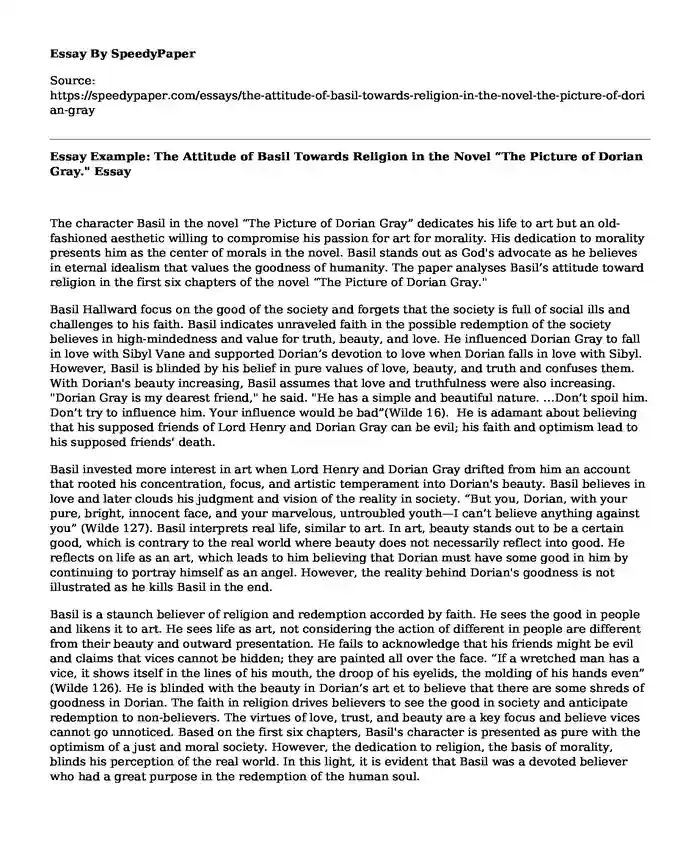
| Essay type: | Book review |
| Categories: | Character analysis Writers World literature |
| Pages: | 3 |
| Wordcount: | 603 words |
The character Basil in the novel “The Picture of Dorian Gray” dedicates his life to art but an old-fashioned aesthetic willing to compromise his passion for art for morality. His dedication to morality presents him as the center of morals in the novel. Basil stands out as God's advocate as he believes in eternal idealism that values the goodness of humanity. The paper analyses Basil’s attitude toward religion in the first six chapters of the novel “The Picture of Dorian Gray."
Basil Hallward focus on the good of the society and forgets that the society is full of social ills and challenges to his faith. Basil indicates unraveled faith in the possible redemption of the society believes in high-mindedness and value for truth, beauty, and love. He influenced Dorian Gray to fall in love with Sibyl Vane and supported Dorian’s devotion to love when Dorian falls in love with Sibyl. However, Basil is blinded by his belief in pure values of love, beauty, and truth and confuses them. With Dorian's beauty increasing, Basil assumes that love and truthfulness were also increasing. "Dorian Gray is my dearest friend," he said. "He has a simple and beautiful nature. …Don’t spoil him. Don’t try to influence him. Your influence would be bad”(Wilde 16). He is adamant about believing that his supposed friends of Lord Henry and Dorian Gray can be evil; his faith and optimism lead to his supposed friends' death.
Basil invested more interest in art when Lord Henry and Dorian Gray drifted from him an account that rooted his concentration, focus, and artistic temperament into Dorian's beauty. Basil believes in love and later clouds his judgment and vision of the reality in society. “But you, Dorian, with your pure, bright, innocent face, and your marvelous, untroubled youth—I can’t believe anything against you” (Wilde 127). Basil interprets real life, similar to art. In art, beauty stands out to be a certain good, which is contrary to the real world where beauty does not necessarily reflect into good. He reflects on life as an art, which leads to him believing that Dorian must have some good in him by continuing to portray himself as an angel. However, the reality behind Dorian's goodness is not illustrated as he kills Basil in the end.
Basil is a staunch believer of religion and redemption accorded by faith. He sees the good in people and likens it to art. He sees life as art, not considering the action of different in people are different from their beauty and outward presentation. He fails to acknowledge that his friends might be evil and claims that vices cannot be hidden; they are painted all over the face. “If a wretched man has a vice, it shows itself in the lines of his mouth, the droop of his eyelids, the molding of his hands even” (Wilde 126). He is blinded with the beauty in Dorian’s art et to believe that there are some shreds of goodness in Dorian. The faith in religion drives believers to see the good in society and anticipate redemption to non-believers. The virtues of love, trust, and beauty are a key focus and believe vices cannot go unnoticed. Based on the first six chapters, Basil's character is presented as pure with the optimism of a just and moral society. However, the dedication to religion, the basis of morality, blinds his perception of the real world. In this light, it is evident that Basil was a devoted believer who had a great purpose in the redemption of the human soul.
Works Cited
Wilde, Oscar. The picture of Dorian Gray. OUP Oxford, 2006.
Cite this page
Essay Example: The Attitude of Basil Towards Religion in the Novel "The Picture of Dorian Gray.". (2023, Sep 26). Retrieved from https://speedypaper.com/essays/the-attitude-of-basil-towards-religion-in-the-novel-the-picture-of-dorian-gray
Request Removal
If you are the original author of this essay and no longer wish to have it published on the SpeedyPaper website, please click below to request its removal:
- Nelson Mandelay Sample
- Good Writing in English as an International Language - Free Essay
- Free Essay on the Effects of Love on the Characters in A Midsummer Night's Dream
- Free Essay Exploring Job Stress and the Work-Life Balance of Working Women with Families
- Amiri Baraka Conversion to Islam and Influence of Other Ideologies, Poetry Essay Example
- Free Essay Analyzing Allen Ginsberg's Poem Howl
- Essay Sample on Making a Prop Moment
Popular categories




